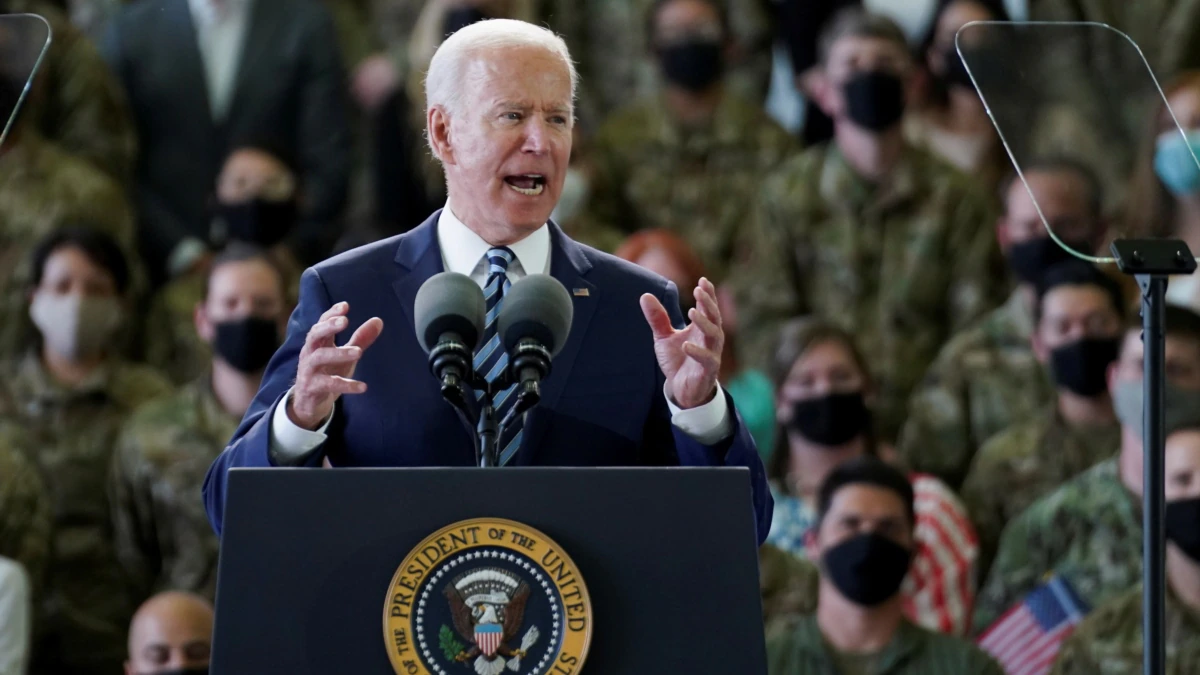U.S. President Joe Biden has kicked off his first official visit abroad by making clear his intention to strengthen ties with allies to defend democracy and a warning to Russia against “harmful” activities.
Addressing U.S. Air Force personnel stationed at a British airbase late on June 9, Biden said he would deliver a clear message to Russian President Vladimir Putin when they meet for bilateral talks next week following separate summits with the Group of Seven (G7), NATO, and European leaders.
“We’re not seeking conflict with Russia,” the Democratic president said at the start of his eight-day visit to Europe.
“We want a stable and predictable relationship…but I’ve been clear: The United States will respond in a robust and meaningful way if the Russian government engages in harmful activities.”
Biden will meet with British Prime Minister Boris Johnson later on June 10 to reaffirm the “special relationship” between Washington and London after Britain’s exit from the European Union.
The sides are set to issue a new version of the Atlantic Charter that was originally agreed by Winston Churchill and Franklin Roosevelt in 1941, setting out postwar goals for democracy, trade, and opportunity.
The new charter “encompasses science, technology and trade” and “underscores our joint commitment to NATO,” Johnson wrote in an article released ahead of his meeting with Biden.
The meeting kicks off a packed agenda for the U.S. president, whose trip culminates in Geneva on June 16 with the face-to-face meeting with Putin amid escalating tensions between Washington and Moscow.
“This is my first overseas trip as president of the United States. I’m heading to the G7, then the NATO ministerial, and then to meet with Mr. Putin to let him know what I want him to know,” he said after touching down at Royal Air Force Mildenhall.
“At every point along the way, we’re going to make it clear that the United States is back and democracies of the world are standing together to tackle the toughest challenges, and the issues that matter most to our future.”
Biden said he was prepared to tell Putin that the transatlantic alliance will remain “a vital source of strength for the U.K., Europe, and the United States.”
One of Biden’s goals during the three-day G7 meeting starting on June 11 is to continue repairing relations with traditional U.S. allies that were damaged under former President Donald Trump’s “America First” foreign policy. Biden will also hold bilateral meetings with the leaders of the other G7 countries — Canada, France, Germany, Italy, and Japan.
Those meetings in Cornwall, southwestern England, will focus on U.S. policy priorities such as the economy, unity among the allies, turning the corner on the pandemic, and pulling the world out of an economic slump sparked by the pandemic.
Building a foundation around those goals “will be the most effective way to show the rest of the world that the United States has the power and purpose to be able to deliver as the world’s leading democracy,” White House national-security adviser Jake Sullivan has said.
Biden is scheduled to meet with Queen Elizabeth II at Windsor Castle outside London before heading on to Brussels for talks with NATO and EU leaders on June 14-15.
Sullivan said both the G7 and the NATO meetings will discuss cyberattacks and how to speak with one voice to countries, including Russia, that are harboring or permitting cybercriminals to operate from their territory.
Biden is scheduled to fly to Geneva on the eve of his meeting with Putin, a man he said during an interview in March he “believed” was a killer. The comments prompted a diplomatic row that led to Moscow recalling its ambassador to Washington for consultations.
The White House has said Biden plans to discuss Ukraine during the summit. Russia seized the Ukrainian region of Crimea in 2014 and Kremlin-backed separatists took control of a chunk of eastern Ukraine the same year.
The Biden administration has also criticized Russia for the arrest and jailing of opposition leader Aleksei Navalny and publicly acknowledged that it has low to moderate confidence that Russian agents were offering bounties to the Taliban to attack U.S. troops in Afghanistan.
Biden will aim to be clear about where the relationship stands and try to identify areas of potential cooperation, Sullivan said, noting that after nearly a week of intensive consultations with allies and democratic partners from both Europe and the Indo-Pacific, Biden will “go into this meeting with the wind at his back.”
The White House has repeatedly said it is seeking a “stable and predictable” relationship with the Russians, while also calling out Putin on allegations that Russia interfered in last year’s U.S. presidential election and that the Kremlin was behind other cybersecurity breaches.
Biden will also discuss the diversion last month by Belarus, Russia’s close ally, of a Ryanair passenger plane that led to the detention of an opposition activist.


















